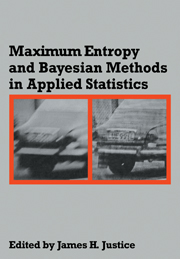 Maximum Entropy and Bayesian Methods in Applied Statistics
Maximum Entropy and Bayesian Methods in Applied Statistics Book contents
- Frontmatter
- Contents
- Preface
- Donors
- Bayesian Methods: General Background
- Monkeys, Kangaroos, and N
- The Theory and Practice of the Maximum Entropy Formalism
- Bayesian Non-Parametric Statistics
- Generalized Entropies and the Maximum Entropy Principle
- The Probability of a Probability
- Prior Probabilities Revisited
- Band Extensions, Maximum Entropy and the Permanence Principle
- Theory of Maximum Entropy Image Reconstruction
- The Cambridge Maximum Entropy Algorithm
- Maximum Entropy and the Moments Problem: Spectroscopic Applications
- Maximum-Entropy Spectrum from a Non-Extendable Autocorrelation Function
- Multichannel Maximum Entropy Spectral Analysis Using Least Squares Modelling
- Multichannel Relative-Entropy Spectrum Analysis
- Maximum Entropy and the Earth's Density
- Entropy and Some Inverse Problems in Exploration Seismology
- Principle of Maximum Entropy and Inverse Scattering Problems
- Index
Multichannel Relative-Entropy Spectrum Analysis
Published online by Cambridge University Press: 04 May 2010
- Frontmatter
- Contents
- Preface
- Donors
- Bayesian Methods: General Background
- Monkeys, Kangaroos, and N
- The Theory and Practice of the Maximum Entropy Formalism
- Bayesian Non-Parametric Statistics
- Generalized Entropies and the Maximum Entropy Principle
- The Probability of a Probability
- Prior Probabilities Revisited
- Band Extensions, Maximum Entropy and the Permanence Principle
- Theory of Maximum Entropy Image Reconstruction
- The Cambridge Maximum Entropy Algorithm
- Maximum Entropy and the Moments Problem: Spectroscopic Applications
- Maximum-Entropy Spectrum from a Non-Extendable Autocorrelation Function
- Multichannel Maximum Entropy Spectral Analysis Using Least Squares Modelling
- Multichannel Relative-Entropy Spectrum Analysis
- Maximum Entropy and the Earth's Density
- Entropy and Some Inverse Problems in Exploration Seismology
- Principle of Maximum Entropy and Inverse Scattering Problems
- Index
Summary
ABSTRACT
A new relative-entropy method is presented for estimating the power spectral density matrix for multichannel data, given correlation values for linear combinations of the channels, and given an initial estimate of the spectral density matrix. A derivation of the method from the relative-entropy principle is given. The basic approach is similar in spirit to the Multisignal Relative-Entropy Spectrum Analysis of Johnson and Shore, but the results differ significantly because the present method does not arbitrarily require the final distributions of the various channels to be independent. For the special case of separately estimating the spectra of a signal and noise, given the correlations of their sum, Multichannel Relative-Entropy Spectrum Analysis turns into a two stage procedure. First a smooth power spectrum model is fitted to the correlations of the signal plus noise. Then final estimates of the spectra and cross spectra are obtained through linear filtering. For the special case where p uniformly spaced correlations are known, and where the initial estimate of the signal plus noise spectrum is all-pole with order p or less, this method fits a standard Maximum Entropy autoregressive spectrum to the noisy correlations, then linearly filters to calculate the signal and noise spectra and cross spectra. An illustrative numerical example is given.
INTRODUCTION
We examine the problem of estimating power spectra and cross spectra for multiple signals, given selected correlations of various linear combinations of the signals, and given an initial estimate of the spectral density matrix.
Information
- Type
- Chapter
- Information
- Maximum Entropy and Bayesian Methods in Applied StatisticsProceedings of the Fourth Maximum Entropy Workshop University of Calgary, 1984, pp. 235 - 253Publisher: Cambridge University PressPrint publication year: 1986